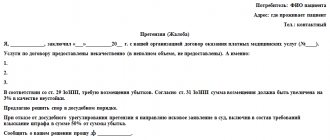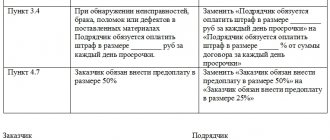Collection of funds under a service agreement takes place on the basis of the clauses of the current agreement. The service agreement is the main document regulating the relationship between the client and the contractor, and in practice there are often cases when one of the parties does not fulfill its obligations in full.
What is the responsibility for services under the contract? Violation of the terms can be initiated by both the customer and the contractor: in the first case, we are usually talking about non-payment of funds, in the second there may be delays in deadlines, poor quality of work, and other problems. In this case, the injured party draws up a statement of claim for debt collection under the service agreement in order to claim it in court.
What funds can be recovered under a service agreement?
An experienced lawyer will tell you in advance exactly what amounts can be recovered from the defendant. Based on this, a petition will be developed. Such amounts include:
- the full amount of compensation (all funds that the client paid under the agreement with the contractor);
- a penalty calculated using a special formula that takes into account the cost of the contract, the period of delay and other factors;
- compensation for moral suffering caused by the situation (they will have to be documented);
- a fine of up to fifty percent of the total amount of claims (imposed for refusal to voluntarily resolve the situation).
Calculations for each monetary amount must be provided in the same petition, supported by evidence (receipts for payment of services, receipts, etc.). When calculating the penalty, you need to take into account its maximum possible size established by law. All calculations are given here, in the descriptive part of the application, or in a separate appendix, which must be attached to the application.
Collection of funds under a service agreement
According to the provisions of Article 32 of the Law of the Russian Federation “On the Protection of Consumer Rights,” the consumer has the right to refuse to fulfill the contract for the performance of work (rendering services) at any time, subject to payment to the contractor for the expenses actually incurred by him related to the fulfillment of obligations under this contract.
The defendant did not provide any evidence of his fulfillment of the obligations stipulated by the agreement concluded between the parties, and the expenses incurred in connection with the execution of this agreement.
Ask your question to a lawyer right now
Plaintiff's claim
The plaintiff filed a lawsuit against the name of the organization for the recovery of funds in the amount of the amount paid under the agreement for the provision of services under the cultural exchange program in the United States, a fine in the amount of 50% of the amount awarded by the court, legal fees in the amount of the amount, expenses upon execution of a power of attorney in the amount of
In support of the stated claim, the plaintiff indicated that he entered into a service agreement No. 4160 AG with the defendant, the subject of which, in accordance with clause 1.5 of the agreement, was the implementation of a complex of intermediary actions to provide the opportunity to participate in the program (a set of actions taken by the sponsor related with receiving a certificate in the name of the participant, providing information support in finding an employer for the latter, supporting the participant at the address and preparing all the necessary accompanying documents).
The contract expired on the date. The plaintiff paid the agency an amount as a registration fee when concluding the contract; in addition, for the preparation of documents, implementation of the necessary activities for the implementation of the program, and preparation of the plaintiff for participation in the program, the plaintiff paid the cost of the program in the amount of the amount.
The plaintiff applied to the defendant to cancel the trip for health reasons, presenting the defendant with a corresponding certificate; the money has not been returned to date.
Conclusions of the court in the case
At the court hearing it was established and follows from the case materials that the date between the full name and the name of the organization was concluded agreement No. 4160AG for the provision of services under the cultural exchange program in the United States. The payment made by the plaintiff under the agreement in the amount is confirmed by the receipt submitted to the case materials for the cash receipt order dated.
As can be seen from the text of the agreement concluded between the parties, the parties indicated that the defendant undertakes to provide the participant with the questionnaires and forms necessary for participation in the program specified in Appendix No. 3 of the agreement, to notify the participant about the stages and deadlines for submitting and signing documents for participation in the program, specified in Appendix No. 3 to the agreement, advice on filling out and completing the documents necessary to obtain a certificate, transfer of the participant’s documents to the sponsor for issuing the certificate, subject to their submission by the participant within the established time frame in Appendix No. 3 to the agreement, as well as transfer of the participant’s documents to the embassy/consulate USA. In this case, the participant pays the consular fee and is independently interviewed at the US embassy/consulate.
In accordance with Art. 779 of the Civil Code of the Russian Federation (hereinafter referred to as the Civil Code of the Russian Federation), under a contract for the provision of paid services, the contractor undertakes, on the instructions of the customer, to provide services (perform certain actions or carry out certain activities), and the customer undertakes to pay for these services; at the same time, according to paragraph 1 of Art. 781 of the Civil Code of the Russian Federation, the customer is obliged to pay for the services provided to him within the time frame and in the manner specified in the contract for the provision of paid services.
In accordance with Art. 309 of the Civil Code of the Russian Federation, obligations must be fulfilled properly in accordance with the terms of the obligation and the requirements of the law, other legal acts, and in the absence of such conditions and requirements - in accordance with business customs or other usually imposed requirements.
In accordance with Art. 310 of the Civil Code of the Russian Federation, unilateral refusal to fulfill obligations is not allowed.
The plaintiff’s payment agreement was executed in full, and funds in the amount were paid in full.
In accordance with paragraph 1 of Art. 782 of the Civil Code of the Russian Federation, the customer has the right to refuse to fulfill a contract for the provision of services for a fee, subject to payment to the contractor for the expenses actually incurred by him.
In the event of controversial legal relations arising from the provisions of paragraph 1 of Art. 782 of the Civil Code of the Russian Federation, the defendant must provide evidence of the costs actually incurred by him in the performance of the obligations assumed under the contract concluded between the customer and the contractor.
According to the provisions of Article 32 of the Law of the Russian Federation “On the Protection of Consumer Rights,” the consumer has the right to refuse to fulfill the contract for the performance of work (rendering services) at any time, subject to payment to the contractor for the expenses actually incurred by him related to the fulfillment of obligations under this contract.
The defendant did not provide any evidence of his fulfillment of the obligations stipulated by the agreement concluded between the parties, and the expenses incurred in connection with the execution of this agreement.
In connection with the above, taking into account that the case materials do not contain evidence confirming that the defendant actually incurred any costs associated with the execution of the contract, as well as evidence that the plaintiff accepted the work performed by the defendant, the defendant is obliged to return the amounts paid under the contract by the plaintiff .
Since the plaintiff’s demand for the return of funds was not fulfilled voluntarily by the defendant, based on the provisions of paragraph 6 of Art. 13 of the Law of the Russian Federation “On the Protection of Consumer Rights”, the court comes to the conclusion that a fine must be collected from the defendant for refusing to voluntarily satisfy the consumer’s demands, while, taking into account the circumstances of the case, the court considers it possible to apply the provision of Art. 333 of the Civil Code of the Russian Federation, collecting a fine from the defendant in the amount of the amount.
Source: Unified portal of courts of general jurisdiction in Moscow
What documents will be required to collect money?
The list of documentation that will be required to consider and satisfy the claim is indicated in the provisions of the Arbitration Procedural Code. It includes the following papers:
- Copies of the application, which must be sent to the other participants in the proceedings (confirmation of such sending is submitted to the court).
- A receipt or original payment order, with a note from a bank representative indicating that the payment has been made (in some cases, a deferment or installment plan is provided, which must be announced in advance if the amount of the state duty assigned based on the price of the application is too high).
- If you have reasons for deferring payment of the state fee, they must be documented.
- A power of attorney when you go to court through a representative (it is drawn up in accordance with the law).
- Confirmation of compliance with the claim procedure and other pre-trial measures, if they are provided for by law or contract.
- Other papers, depending on the specific proceedings (check the list with your lawyer).
This is also important to know:
Debt collection under a lease agreement for non-residential premises: procedure
After the list of documentation, you must put the date of application and the signature of the plaintiff.
Rules for filling out the form
According to the requirements of Article 126 of the Arbitration Code, the application must be in writing and endorsed by the signature of the plaintiff himself or his legal representative.
The document is compiled as follows:
- at the top in the corner the name of the specific arbitration court where the claim will be sent, the full name, address and telephone number of the plaintiff, as well as the defendant;
- Below in the center is written the name of the application in full form;
- in the text of the claim it is required to indicate the circumstances that led to the application to the court, to name evidence confirming the fact of violation of the terms of the contract;
- Below are the regulatory legal acts in accordance with which the designated amount must be recovered from the defendant or forced execution of obligations must be imposed;
- then a wording is drawn up with a request to the court to collect or force the work to be performed, indicating what the price of the statement of claim is based on;
- information is provided on pre-trial actions to resolve the conflict, if any;
- list of attached certificates and papers;
- date of compilation and signature.
The plaintiff must make several photocopies of the complaint and send them to the persons involved in the case, including the defendant and third parties. Copies of the attached documents will also be required. The set must be sent by registered mail, and a notification must be issued, since without this the recipient will be able to say that he did not receive a copy of the claim: this will complicate the review process.
Pre-trial resolution of disputes under service agreements
Pre-trial resolution of conflict situations under a service agreement is mandatory if the transaction is concluded between legal entities, as well as if this procedure is mandatory by virtue of the agreement.
However, as practice shows, it is better to try to come to an agreement and resolve the issue amicably, because litigation is a long and costly matter, which can also cause serious reputational losses to the contractor. Pre-trial recovery involves filing a claim. This document does not have a legally established form and can be drawn up in any form with the obligatory indication of the following data:
- The grounds on which the obligations arose (contract or other agreement);
- Fact of violation by the customer or contractor of its obligations under the contract;
- Demands to pay or return funds in the agreed amount;
- List of further actions if the claim is not satisfied.
At this stage of resolving the issue, it is important to find sufficiently convincing arguments to force the customer or contractor to pay/return the money. Therefore, it is better to entrust the drawing up of a claim and further resolution of the issue (negotiations, possibly going to court and representing the client’s interests there) to an experienced lawyer.
What laws to follow
The nuances of drawing up, filing and considering such claims are regulated by several legislative and regulatory acts, including the following:
- Resolution of the Supreme Court of the Russian Federation No. 29 “On the application of civil procedural legislation” dated December 11, 2012.
- Article No. 395 of the Civil Code of the Russian Federation.
- Federal Law No. 143 “On acts of civil status” dated November 15, 1997.
- Federal Law No. 230 “On the protection of the rights and interests of individuals” dated 07/03/16.
- A number of regional regulations that control the work of Russian courts.
Debt collection is carried out on the basis of the texts of these documents on a compulsory basis for both individuals and legal entities.
Sample statement of claim for debt collection under a service agreement:

Collection of receivables under a service agreement
Does the customer refuse to pay for the services you provide? The act has not been signed, but the work has been done? Does the customer have unreasonable demands for your work that are not included in the terms of reference? Contact us, together we will force the customer to fulfill his obligations under the contract. This is called collection of accounts receivable.
The risk of non-payment in the service sector is complicated by the fact that the subject of the contract for the provision of services is most often of an intangible nature and the problem is proof of the fact of provision of the service . This risk is especially evident in the case of consulting services. In the case of trade and the same transportation services, the issue is resolved more simply. No sane business entity will transfer goods or accept them for transportation without having signed shipping documents in hand. Exceptions to this rule can only be explained by low legal culture. Since the movement of goods without proper documents has negative consequences from the point of view of public tort law. With services, everything is different, since the customer will almost never agree to immediately sign the acceptance certificate for the services provided and will be right. After all, by signing the act, he will lose the opportunity to file a claim in the event of poor-quality services.
In order for the collection of receivables to proceed smoothly, you should always include in the service agreement a provision on automatic acceptance of the delivery and acceptance certificate for services rendered by the customer. It should be indicated in the contract not only that the acceptance certificate received and not returned within the prescribed period means acceptance of the services. But also that the executor in the situation under consideration has the right to draw up a unilateral act, which will have the legal force of a bilaterally signed act. The presence of such provisions in the contract will make it possible to collect the debt under the contract for the provision of services in the order of writ proceedings .
However, if the customer refuses with reason to accept the services provided , we can only talk about filing a lawsuit against him. In this case, the problem arises of proving the fact of high-quality and timely provision of services. Witness testimony and written evidence may be provided as evidence. Written evidence refers primarily to correspondence between the parties to the contract. The maximum volume of document flow with the customer should be ensured either by registered mail with return receipt requested or by courier delivery. Electronic correspondence may have dubious evidentiary value. Especially if we are not talking about the email specified in the details of the contract, but about correspondence on social networks and messaging services. If the defendant takes an active position, such messages will almost never be able to be evidence. After all, even a fax is often perceived negatively by conservative representatives of the judiciary. But it is almost impossible to refute the receipt of a letter in the presence of a notification of delivery from RUE “Belpochta” if it is signed by a person authorized to receive postal correspondence.
Testimony from the contractor's employees can also serve as evidence. Especially with regard to proving the time spent on work, subject to payment according to the approved tariffs. If the contractor engages third parties (subcontractors) to perform the work, this possibility must be stipulated in the service agreement. Otherwise, the defendant may refer to the fact that the contractor’s costs of paying third parties are not subject to reimbursement. Since, as a general rule, the contractor is obliged to personally provide services.
The rights of customers who are consumers are subject to special legal protection. In particular, with regard to the right to refuse acceptance of services provided. However, one should take into account the fact that consumer rights claimed by individuals who are not individual entrepreneurs, but who order services clearly not for personal, household or family needs. For example, the founder of a design agency can order services to create a website for a design agency. Of course, the dispute will be subject to the jurisdiction of a general court, since a party to the agreement is an individual. But the obvious discrepancy between the result of services and consumer goals makes the debtor’s reference to legislation protecting consumers unlawful.
Also important for the effective collection of receivables in favor of the contractor is the presence of the correct terms of reference in the contract. This is especially important when providing complex services, such as creating a website, business plan, or marketing research . However, the presence of such a task is also important in the event of a violation of the rights of the customer who made an advance payment but did not receive the ordered services.
Contact information: Andrey Nikolaevich Skobey, licensed lawyer, you can contact him by phone (+37529 1102388) or by email ( [email protected] ).
Reasons
The grounds for drawing up a statement are recorded cases of violation of the terms of the contract and regulations specified in the claim.
The facts indicated in the document include the following circumstances:
- failure by a party to fulfill the obligations specified in the contract;
- delays or failure to meet deadlines for the provision of services or delivery of products;
- low quality of work performed;
- low-qualified specialists are involved in the provision of services, while the contract provides for the work of more competent professionals;
- an unmotivated increase in the amount of payment that occurred through no fault of the plaintiff (for example, an increase in the cost of the service itself);
- causing material damage during work;
- other reasons that constitute a violation of any clauses of the concluded agreement.
The injured party has the right to claim the following:
- fulfillment of obligations under the concluded agreement;
- recognition of a unilateral change in the conditions specified in the document as unacceptable;
- payment of funds due to the injured party under the contract;
- collection of interest for the use of other people's finances during the entire period of delay (penalty).
This is also important to know:
What is damages recovery and how does it happen?
The specific list of requirements depends on which party violated the contract and the type of violation. The statement of claim is submitted to the arbitration court body.
Additional documents
According to Article 126 of the Arbitration Code, a number of additional papers must be attached to the application.
These include the following documents:
- papers that confirm the fact that photocopies of this claim and additional documents have been sent by mail with notification to all parties involved in the conflict;
- papers confirming that the plaintiff has paid the state fee for consideration of the claim;
- documents that serve as confirmation of a violation of the rights of the plaintiff and non-compliance by the defendant with the obligations specified in the text of the contract;
- photocopies of the state registration certificate, if the plaintiff is a legal entity;
- a notarized power of attorney or other documents that confirm the right to sign the application (relevant if the claim is filed by a representative and not the plaintiff himself);
- other papers that may be required by the arbitration court to clarify the circumstances of a particular case.
Features of claiming debt through court
The judicial collection process includes the following stages:
- Preparation of a pre-trial claim, an attempt to resolve the conflict peacefully.
- Collecting documents and drawing up a claim, which lists all the circumstances, names the defendants’ violations of specific clauses of the contract and indicates the amount that must be recovered by force.
- Payment of state duty. This can be done at any bank, including through a terminal or using online services. For a plaintiff who is a legal entity, the fee will be 4 thousand rubles, and for an individual – 200 rubles. In the future, the plaintiff has the right to recover legal costs from the defendant, but their amount cannot exceed 60 thousand rubles. After paying the state fee, the receipt is attached to the set of documents and submitted to the arbitration court along with the claim.
- At the specified time, the court considers the application and then renders a verdict. In the case of a compensation transaction, the defendant is given a certain time to appeal the decision.
- In case of re-examination and confirmation of the decision or in the absence of a requirement to appeal the verdict, the next stage includes debt collection with the help of bailiffs or by a writ of execution (the second option involves independent collection of funds).
This is also important to know:
Sample statement of claim to court for recovery of funds
In any case, it is necessary to first attempt a pre-trial settlement of the conflict: this will save time and legal costs. In many cases, if the customer has temporary financial difficulties, it is possible to reach a compromise and achieve phased payment for services. Only after this is it necessary to collect papers for the court.
The following documents may serve as an attachment to the claim:
- text of the agreement with signatures and seals;
- additional agreements with the client;
- acceptance certificates confirming that the customer received the service in full;
- examination reports that confirm the proper quality of work;
- settlement reconciliation documents.
All papers must be endorsed by both parties, and they must bear the seals of the relevant organizations. For judicial review, certified photocopies are provided; original papers may be requested separately, for example, for expert verification. If the claim is successful, compensation for damage, payment of the amount due under the contract and costs must occur within the time frame established by the judicial authority. If it is impossible to recover the debt under the writ of execution, the plaintiff has the right to seek the help of bailiffs.
On debt collection under an agreement for the provision of facility security services
Company A filed a claim with the Arbitration Court of the Perm Region against Company B for the collection of debt for security services provided and penalties. By the decision of the Arbitration Court of the Perm Territory dated April 17, 2015, the claims were satisfied in full. By the decision of the Seventeenth Arbitration Court of Appeal dated July 7, 2015, the decision of the first instance court was left unchanged. The essence of the dispute: Society B filed a cassation appeal, in which it asks the court decisions to be annulled. As the applicant points out, the conclusions of the courts do not correspond to the evidence available in the case, the norms of substantive law have been violated (Articles 702, 722, 720, 779, 781, 783 of the Civil Code of the Russian Federation). According to the defendant, the courts incorrectly assessed the evidence presented in the case file and made incorrect conclusions about the proof of the services provided. The defendant believes that the fact of provision of security services by the plaintiff has not been proven, since the defendant did not sign certificates of service provision, did not pay for security services, and did not submit a duty log. Society B believes that the courts gave an incorrect assessment of the evidence, namely the contract, the act of acceptance and transfer of the object under protection, the letter from the deputy chief of police about the receipt of messages from security guards about attempted abductions to the police, and therefore the circumstances relevant to affairs. The court's position: the courts established that an agreement on the paid provision of security services was concluded between Company A (performer) and Company B (customer). According to the security agreement, the customer instructed, and the contractor assumed the obligation for a fee, to protect the customer’s property at the protected facility from illegal actions, to suppress and prevent them, to maintain public order at the protected facility and to ensure checkpoints and intra-facility regime. In accordance with the transfer and acceptance certificate, the object was transferred under protection. During the disputed period, the plaintiff, in pursuance of the contract, provided services for the protection of the specified object. By letter, the plaintiff sent a claim to the defendant demanding payment. In connection with the defendant’s improper fulfillment of the obligation to pay for the services provided, the plaintiff filed a claim with the arbitration court to collect the debt for the services provided to protect the facility and penalties. The courts, having established the fact of the provision of security services for the facility and the absence of evidence of payment by the defendant for the services, satisfied the claims for the collection of debt for the security services provided and penalties. Based on Art. 309 of the Civil Code of the Russian Federation, obligations must be fulfilled properly in accordance with the terms of the obligation and the requirements of the law, other legal acts, and in the absence of such conditions and requirements - in accordance with business customs or other usually imposed requirements. According to paragraph 1 of Art. 779 of the Civil Code of the Russian Federation, under a contract for the provision of paid services, the contractor undertakes, on the instructions of the customer, to provide services (perform certain actions or carry out certain activities), and the customer undertakes to pay for these services. The customer is obliged to pay for the services provided to him within the time frame and in the manner specified in the contract for paid services (clause 1 of Article 781 of the Civil Code of the Russian Federation). By virtue of paragraph 1 of Art. 395 of the Civil Code of the Russian Federation for the use of someone else’s funds due to their unlawful retention, evasion of their return, other delay in their payment or unjustified receipt or savings at the expense of another person, interest on the amount of these funds is subject to payment. The amount of interest is determined by the discount rate of bank interest at the place of residence of the creditor, and if the creditor is a legal entity, at the place of its location on the day of fulfillment of the monetary obligation or its corresponding part. When collecting a debt in court, the court may satisfy the creditor's claim based on the discount rate of bank interest on the day the claim was filed or on the day the decision was made. These rules apply unless a different interest rate is established by law or agreement. The arguments of Company B that the courts came to an incorrect conclusion about the proof of the provision of the disputed services must be rejected, since the fact that the plaintiff provided the defendant with services under the contract was established by the courts based on an assessment of the entire body of evidence presented by the parties. The cassator's reference to the failure to sign certificates of services rendered, the lack of payment on the part of the defendant and the failure to submit a log of the delivery and acceptance of duties is subject to rejection as unfounded. The plaintiff monthly handed over documents to the defendant for payment for services rendered; a full package of documents was also handed over along with the claim, but the defendant deliberately avoided signing the acts. In accordance with the disputed clause of the contract, the customer is obliged to sign the act of services provided by the contractor within 5 days or submit written objections; in case of failure to submit these objections within the prescribed period, the act is signed by the contractor unilaterally and is considered properly executed. During the trial, company A submitted to the court a report on the loss of documents, including the duty log. The appellate court correctly stated that the mere absence in the case materials of the duty delivery and acceptance log, if there is other evidence in the case materials of the provision of security services, does not refute the conclusions of the trial court about the satisfaction of the claims. The courts also reasonably took into account the act of reconciliation of mutual obligations for the disputed period, presented in the case materials, signed by the defendant without comments and containing the seal of the defendant’s enterprise and confirming the debt of the defendant to the plaintiff. Thus, the claims for the collection of debt for the services provided to protect the facility and penalties were legally satisfied by the courts. You can familiarize yourself with the Resolution of the Arbitration Court of the Ural District dated October 20, 2015 No. F09‑7606/15 in the ConsultantPlus legal reference system in the “Judicial Practice” section. Tatyana Osipovskaya First Perm legal portal







